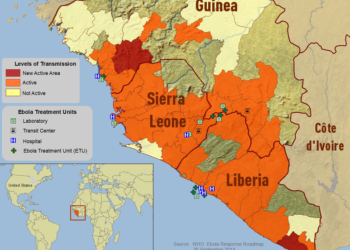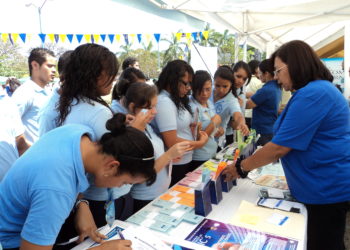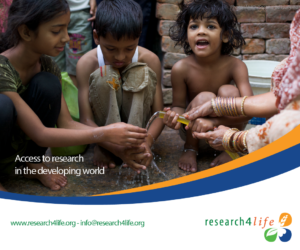One of the most compelling arguments for open access (OA) is making research literature freely available in lower-income countries. A common narrative used to portray this benefit (most recently appearing this week in the Wellcome Trust’s response to UCL’s Plan S statement) revolves around a New York Times opinion piece about the 2014 Ebola outbreak in Liberia. In that article, Liberian health officials explain away their lack of knowledge about previous research findings that could have abated the public health crisis by noting that papers about that research, some more than 30 years old, were behind unaffordable subscription access barriers. The story is compelling and puts a human cost on the need for OA. It is also factually inaccurate, and misleading in its simplicity.
The researchers in question actually did have no-cost access to the missing papers through the Research4Life program, but it remains unclear whether the researchers or their institutions ever registered to set up that access. Back in 2015, Roger Schonfeld took a deeper look in a post titled, “Discovery and Access in Light of the Ebola Crisis“. The post asks important questions that remain unanswered about the need for more than just free access to articles, but rather improvements in discovery tools, training, and research infrastructure.

That post is worth a revisit, as it is largely echoed by nearly every post we’ve had that talks about research in lower-income countries. As most point out, free online access is great, but doesn’t mean much if you don’t have a computer or can’t get online.
Later that same year, INASP’s Anne Powell wrote a post further discussing the Liberian Ebola crisis, stating that “Availability Does Not Equal Access“. She explains the continuing problems:
This discussion for INASP has moved on from the issue of availability onto one framed by access and discoverability. There seem to be breaking points all along the way, which, of course, are also points at which solutions can and need to be found. What are the breaking points? Very often they are where communication is not happening and where the provider (of information, materials, IT systems, platforms), whether publisher, librarian, network engineer, does not understand the user (student, researcher, health worker, librarian); their needs, knowledge limitations or experiences.
In his guest post, Research4Life’s Richard Gedye noted that program’s success with some of the research community in developing countries, but noted the key points of failure:
Without training in effective information discovery and use, simply providing access to content will always represent a job only partially done…There is a significantly greater gap to fill between North and South when it comes to issues like technological infrastructure (especially manifested in often very poor internet bandwidth) and research funding.
Global researchers expressed similar concerns in our two posts about “Achieving Equitable Participation in Open Research” (Part 1 here, Part 2 here). OA is clearly a positive step toward a more inclusive and equitable global research community, but it is not enough on its own and should not be portrayed as some sort of magical panacea. As Jesca Karungi from the Consortium of Uganda University Libraries aptly states:
Much as OA ensures that research outputs are shared to benefit communities that cannot afford paid content, this noble goal can only be achieved if the enabling environment at the academic libraries is provided.
Discussion
4 Thoughts on "Access Alone Isn’t Enough: Revisiting Calls for Discovery, Infrastructure, Technology, and Training"
As the new Publisher Coordinator for Research4Life, I couldn’t agree with you more, David! The Sustainable Development Goals make it clear that access to information is not an end in itself, but a catalyst *for* development, and that unless researchers (and others) in the Global South develop the skills to discover, interpret and manipulate that information, the digital divide will simply grow ever wider.
We will be investigating how to level the playing field for researchers in the Global South at the forthcoming Researcher to Reader conference, and again at the STM Spring Conference in April, so it is a subject that will hopefully attract a lot of attention this year.
I am reminded of the old joke:
Do you know how to play the piano?
Yes, with your fingers!
Thank you for this valuable overview of recent posts on the issues of access, awareness and discoverability. This is very timely for us at INASP as we take a look at the status of access to research materials in low- and middle-income countries and reflect on the gaps today. Much has changed over the 25 years since we began working to support research access, and our thinking at INASP is evolving in response to this. We’ve just published a blog post that outlines our thinking (http://blog.inasp.info/supporting-access-global-information-evidence/), but in summary the trends we see are:
Global shifts
– Growth in open access publishing
– Change in the economy of access and publishing
– Greater access to publishing technologies
– Improvements in search and discovery technologies
Southern shifts
– Growth in Southern research systems
– Improvements in Southern research journals
– Improvements in digital systems and connectivity for Southern research and higher education
– Increased demand for evidence by Southern policymakers and practitioners
These shifts, what INASP and our partners have learnt over the last five years, and changes in the funding landscape suggest that we now need to focus on new approaches to enabling access in order for our work to have the greatest impact. Going forward, we’ll be exploring partnerships and projects to:
– Increase awareness and researchers’ skills
– Increase availability of a broader range of research
– Strengthen national information access systems
We’ll be sharing more concrete ideas and opportunities for collaboration as they emerge but please share your thoughts with us, or get in touch if you have questions.
As a librarian trying to get researchers to use R4L databases more, I would love to be able to do an integrated search. User comments during trainings have been about having too many sign-on methods and passwords. I believe users will find it less cumbersome and may use the resources more.



